If you are lying awake at night or can’t fall back to sleep after waking up, night after night, you may have insomnia. The sleep disorder, where you find it hard to get quality sleep consistently, can be associated with stress and anxiety, while people with underlying health conditions could be prone to insomnia too.
Bad sleep hygiene or lifestyle habits, such as not sticking to the same bedtime, or drinking alcohol to help you fall asleep, can also lead to insomnia. If this disorder is left untreated, it can lead to serious sleep deprivation and other health conditions.
Some sleepers may be able to cure their insomnia with simple lifestyle changes while others may have to seek medical advice. We asked two doctors, Dr Chelsea Perry, sleep expert and owner of Sleep Solutions, and Dr Chris Allen, sleep science advisor at Aeroflow Sleep, for their advice on how to cure insomnia, as well as the leading causes of this sleep disorder.
What is insomnia?
If you’ve never heard of insomnia it’s a sleep disorder which makes it difficult or sometimes impossible to get the recommended 7-9 hours of sleep which we all need every night. But, what are the main symptoms?
“Insomnia makes it hard to fall asleep, stay asleep, or get restful sleep despite having the opportunity. It can leave you feeling tired, irritable, and unfocused,” explains Dr Perry.
Those who are prone to stress, anxiety, and underlying medical conditions and even women going through menopause can be affected by the sleep disorder, with Dr Allen adding that insomnia can be “acute (short-term) or chronic (lasting for a month or longer).”
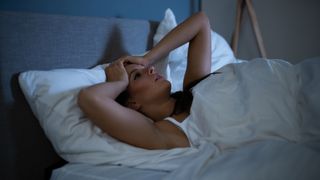
5 ways to cure insomnia
Before you consult your doctor there could be some simple lifestyle changes to help you cure insomnia. Here's what Dr Perry and Dr Allen suggest.
1. Stick to a bedtime and wake up time
If you’ve never had a consistent bedtime your body can become confused – almost as though you're jet-lagged. So, what’s the solution? Dr Perry, suggests ‘improving your sleep hygiene’, and goes on to add that “keeping a consistent bedtime can help your body develop a routine, making it easier to drift off.”
While Dr Allen adds that, even as the seasons change your bedroom should replicate that it’s night time. He explains you can do this by: “keeping the bedroom dark, quiet and cool can also help regulate the body’s internal clock and promote better sleep.”
2. Avoid alcohol before bed
Even one glass of wine, unfortunately, can affect your sleep – so limiting or cutting out alcohol if you have insomnia is another lifestyle change that could transform your ability to get good rest.
So how does alcohol make our time in bed more difficult? Studies show that alcohol can affect the amount of rapid eye movement (REM) sleep we get – a type of deep sleep we need for brain health and concentration. It can also lead to frequent nighttime awakenings as the initial sedative effect wears off, worsening insomnia symptoms.
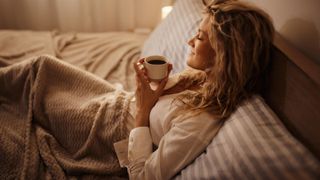
3. Try relaxation techniques
While you may not be able to relax when you’re stressed about not sleeping, building a relaxing routine into your evening, even for five or 10 minutes before you jump into bed, could calm both your body and mind.
Dr Allen says this is because: “Relaxation techniques reduce physical and mental tension, which can make it easier to fall asleep. Mindfulness meditation, for example, can calm the mind and reduce the racing thoughts often associated with insomnia.”
If you're not sure where to start download an app such as Calm or Headspace or even check out one on YouTube. Specific breathing exercises like the 4-7-8 method and moon breathing can also help.
4. Exercise during the day
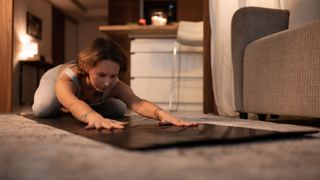
It may feel like the last thing you want to do but “exercise improves sleep quality by reducing stress and anxiety, as well as helping regulate the sleep-wake cycle,” explains Dr Allen, “Aerobic exercise in particular has been shown to improve sleep latency (the time it takes to fall asleep).”
Dr Perry agrees, explaining that physical activity, particularly during the day, not only improves overall health but also ‘enhances the depth and quality of sleep’. She also adds that if you do your exercise in the morning you're getting two benefits: “Exposure to morning sunlight can help reset your circadian rhythm, especially if insomnia stems from misaligned sleep patterns.”
5. Avoid exposure to blue light
We all know that scrolling continually on our phones can be bad for us, but what’s the science behind it? Studies show that too much blue light, which is emitted from our phones, can suppress melatonin, a hormone, which our bodies naturally produce to make us sleep.
So, what do the experts recommend? “Using blue light-blocking glasses or avoiding screens for at least an hour before bedtime can support better sleep onset,” Dr Allen suggests.
You can also put a sleep mode on your phone, or a timer, which tells you how long you’ve been scrolling for. If you can, put your phone in another room an hour before bedtime, and see if this new habit helps you sleep.
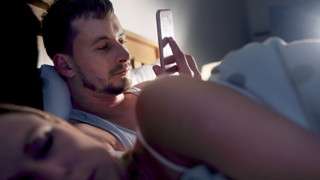
What causes insomnia?
We’re all different and if you experience insomnia, your inability to sleep could be caused by something completely different to someone else who has the disorder, but these are the most common causes.
1. Underlying medical conditions
We know our bodies best, and a change in your sleep pattern could be a sign that your body is alerting you to something more serious. But, what conditions cause sleep loss?
“Medical conditions like anxiety, depression or chronic pain can keep the mind or body too active to rest. Each of these disrupts the natural balance your body needs to transition into sleep,” explains Dr Perry.
2. Poor sleep hygiene or lifestyle habits
Poor sleep hygiene, such as not keeping to a regular bedtime, could be causing you insomnia, while Dr Allen also adds that bad lifestyle habits could be to blame too, and, “excessive screen time before bed, or consuming stimulants (like caffeine or nicotine) can disrupt the body’s natural sleep patterns, leading to insomnia.”
3. Stress and anxiety
Stress or anxiety can affect how quickly you fall asleep or even how long it takes you to get back to sleep, with Dr Perry adding that stress is a big factor because it “ramps up your body’s ‘fight or flight’ response, making it hard to relax into sleep.”
So, why does this happen? “Stress activates the hypothalamic-pituitary-adrenal (HPA) axis, leading to increased cortisol levels and heightened alertness, which make it difficult to relax and fall asleep,” explains Dr Allen.
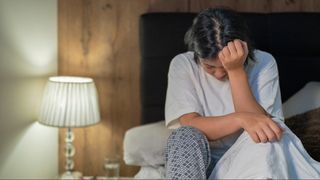
When to see a doctor for insomnia
Of course, there are times when you’ll need to see a doctor for insomnia, and Dr Allen warns that if you haven’t seen any changes in your sleep within “3 weeks, despite implementing lifestyle changes,” this could be the time as “Chronic insomnia can lead to significant health issues if untreated.”
Other underlying issues such as “trouble focusing, worsening mood, or low energy,” explains Dr Perry, that are persistent or “last more than a few weeks should also raise a flag because they could indicate an underlying problem that needs attention.”





















 English (US) ·
English (US) ·